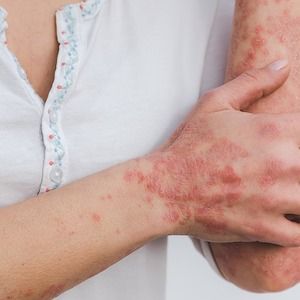Article
Research Shows Dose Escalation of Adalimumab May be Effective for Psoriasis
Author(s):
A research team described data regarding the potential of escalating adalimumab doses for certain patients with psoriasis.

Research suggests that an escalation of adalimumab dosage from once every 2 weeks to once-per-week was effective for psoriasis patients if standard dosing was ineffective.
In a letter to the editor, a research team led by Amaani Hussain, MB, ChB, of the Royal Victoria Infirmary’s Department of Dermatology, described their research into dosing changes with regard to biologic treatments for psoriasis.
“Serum levels of adalimumab are predictive of clinical response in psoriasis and a therapeutic range has been determined,” Hussain and colleagues wrote. “Clinical trial data have demonstrated that dose escalation from fortnightly to weekly is an effective and safe strategy in psoriasis and other immune mediated inflammatory disorders.”
Background
The investigators found that real world data was lacking regarding the increase of adalimumab dosing for psoriasis patients, which led she and her research team toward analyzing patient responses to dose increases in clinical settings. They used patient records in which treatment was escalated to weekly doses, collecting records from January 2018 to May 2022.
The researchers’ inclusion criteria were patients having been prescribed adalimumab once every 2 weeks for 3 months before escalation of their dosage. They also recorded patients’ Dermatology Life Quality Index (DLQI) and Psoriasis Area Severity Index (PASI) scores both at each patients’ dose escalation baseline (DEB) and then 3 or 6 months after.
A total of 45 psoriasis patients met the investigators’ inclusion criteria, and the mean age of the included patients was 51.6 years. In 38 of the 45 patients, adalimumab was the first biologic treatment given. The baseline median DLQI score was 11 (IQR 12) and the baseline median PASI score was 7.1 (IQR 6.0).
Results
The investigators found that by 3 months, DLQI and PASI scores were found to have improved in 58% of patients. Specifically, 17% achieved PASI 75 and 42% achieved PASI 50 scores compared to the escalation baseline. Then after 3 more months, they found that the patients’ reported improvements were shown to have been maintained, with 21% achieving PASI 75 and 45% achieving PASI 50.
The research team found that 70% of patients with measured adalimumab levels were subtherapeutic at baseline, with 12 patients having their levels recorded at both baseline and 3 to 6 months.
“In our study, 5/33 had adalimumab antibodies and undetectable serum levels at DEB,” they wrote. “Surprisingly, 2/5 of these patients experienced PASI improvement with dose escalation, without an increase in adalimumab level. Four of these 5 patients with antibodies at DEB had levels measured on follow-up and all four patients had undetectable levels on both occasions.”
This research letter, “Increasing to weekly adalimumab dosing leads to improved psoriasis outcomes – a retrospective single centre review of real-world data,” was published in the Journal of the European Academy of Dermatology and Venereology.




